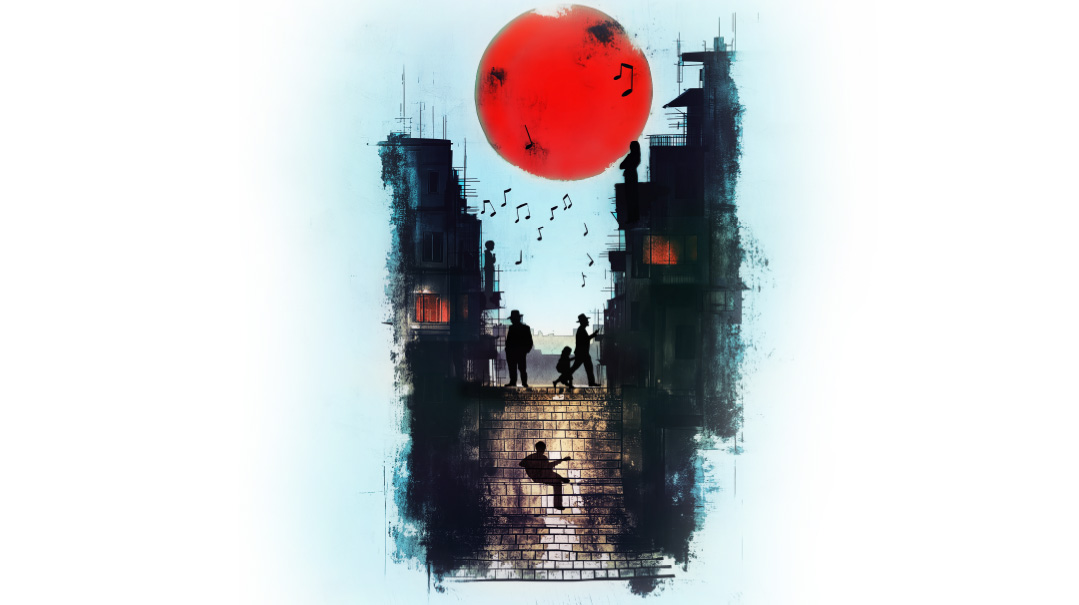Last Stop: Chapter 4
| March 7, 2023Eliezer winces. Whoever had put Yudi into a classroom with explosive chemicals clearly hadn’t thought it through

Chana plans for an upcoming school event at Rivky’s house. After a humiliating run-in with Eliezer at the bus, Naftali bonds with Yudi, then spots him with some shady friends.
“I’ve put up with the worst of the worst,” Mr. Jamison says, pacing back and forth in front of Eliezer’s desk.
He moves with such vigor that he nearly knocks over the elaborate Havdalah candle, the wax shaped like a perfect replica of Ohr Gershon, that Rivky had gotten Eliezer for his last birthday. Eliezer subtly pulls it closer to him. “I silenced Daniel Rodin in my class. I got through to Yechiel Kaiman. But I have had it with Yudi Stein.”
“I hear you,” Eliezer says wearily. He’s beginning to regret the memo he’d sent last month in which he’d instructed the teachers to send any Yudi issues directly to him. He hadn’t been sure then if it was because he felt directly responsible for Yudi or because no one else could handle Yudi. Now, he’s fairly certain that he’s just a glutton for punishment.
Mr. Jamison is on the warpath. “I know that there isn’t a lot of value put on secular subjects in this school,” he says, eyes flashing under his thick glasses, and Eliezer sighs internally. Mr. Jamison isn’t shy about what he believes about Ohr Gershon, but he’s also the best chemistry teacher they’ve ever had. “But I like the challenge. I like trying to get boys interested in science. But I can’t do a thing when Yudi Stein is digging through my cabinets before class and pouring delicate solutions over his friends’ heads!”
Eliezer winces. Whoever had put Yudi into a classroom with explosive chemicals clearly hadn’t thought it through. “I’ll speak to him,” he says.
“And it’d be one thing if that was all he did. I can handle that. But he echoes.”
“Echoes?”
“He repeats every word I say, a few seconds later,” Mr. Jamison says furiously. “And when I call him out on it, he claims he’s just mumbling to himself. But I know. I’m onto him.”
Eliezer takes a deep breath. He finds that when he feels calm, the words emerge strong and authoritative. “I’ll deal with him,” he says firmly, and Mr. Jamison looks satisfied at last.
Eliezer leans over to the phone once the chemistry teacher finally leaves and calls his secretary. “Send Yudi Stein to me, please.” He leans back in his seat, turning to gaze out the window beside it.
Below his office is the preschool playground, and he can hear their shrieks of joy filtering up to him. They come to school happy, and they leave happy. Inevitably, of course, the joy fades as the years progress, but Eliezer likes to think that there’s still an eagerness to learn in Ohr Gershon, still satisfaction to be found as the boys age.
He wonders sometimes what it might be like, experiencing Ohr Gershon from the other side. If he’d had a son, would his child hold onto that same love for learning? He thinks of little Ari, Naftali’s boy, bent over a Chumash with his brow furrowed, and a pang of longing nearly overwhelms him.
It’s a strange thing, to be envious of Naftali.
He straightens, rubbing a hand over his beard and watching the door instead. He likes to be prepared when Yudi Stein comes to his office. He shifts over a Gemara, moves the wax replica of the yeshivah a little further away from errant pacers, and he’s ready when Yudi stalks in, the perpetual storm cloud hanging over him.
“Yehuda,” he says, and he keeps his voice stern but calm, unwilling for this to explode. “Do you want to explain to me what’s been going on in your chemistry class?”
Yudi’s lip twists. “At least I bother showing up,” he says. “You know how many guys skip class? Mr. Jamison has it in for me.” His jaw works under his skin. “I didn’t go through his cabinets. The cabinet was open. We thought it was water in the cup until he started shrieking at us.”
It all sounds perfectly reasonable when Yudi explains it, as though this is just another misunderstanding. Yudi is skilled at that, dismissing egregious incidents as though they’d never happened at all. I was talking to one of the other guys and Rabbi Alpert assumed I said it to him. I wasn’t cheating, I was just finished and bored. I didn’t skip shiur, I was in the bathroom. The truth is a murky thing where Yudi is concerned, floating between what had been and what could have been.
Eliezer is accustomed to this. Without a word, he shifts his chair to face the computer on his desk and locates the cameras. As Yudi watches, sullen and silent, he clicks on the camera in the chemistry lab and scans through the footage until he finds the cabinet.
It is open, if one is very generous with the word. The cabinet door is cracked slightly ajar. Yudi crouches in front of it and yanks it open, peering through the items inside.
Wordlessly, Eliezer turns his screen to show it to Yudi. Yudi shrugs, the presumption of innocence gone and a new argument blooming. “Yeah? He should have locked it. My parents would hate to hear that a teacher is leaving dangerous chemicals out for students to touch.” He cocks his head, insolent and unbothered.
His parents haven’t come to a single school function since Yudi began here in tenth grade. But the threat hangs between them, a reminder of who exactly the Steins are. Eliezer grinds his teeth together and says, “This is unacceptable. Your behavior is unacceptable.”
His voice rises, and Yudi’s rises with it. “I didn’t do anything wrong! It was open!”
“And mocking your teacher? Echoing his words?” Eliezer demands. “Was that nothing wrong?” Yudi never stops defending himself, and never, ever takes responsibility. Eliezer has taken to memorizing a list of offenses, reminders of every incident until Yudi can’t claim that they’re each isolated. “The cheating? The incident last week when you broke a desk—”
“I kicked the side! It just fell over!” Yudi snaps. “I didn’t—”
“You did,” Eliezer says, his voice steely. “You continuously disrupt this yeshivah and disrespect our rebbeim and teachers. I don’t want to hear excuses.” Yudi is silent, glaring at him. “I want to see significant improvement from you.
“You’re a bright boy,” he adds, and Yudi’s eyes go blank at that, the praise flowing over him like oil on water. “You could be top of your shiur if you put as much work into learning as you do into that attitude of yours.”
Yudi laughs, bitter and mocking. Eliezer grits his teeth again. Well. Maybe that argument doesn’t work as well on someone like Yudi, who has never excelled. Even the rare rebbe who’d gotten through to him, had only eked out mediocre grades instead of abysmal ones. Yudi is bright, but years without any drive have left him with little skill for Gemara.
“I expect more of you,” he says at last.
“Wow,” Yudi says, so deadpan that Eliezer can’t even call out his chutzpah. “That means the world to me.” He stands up, leaning against the back of his chair in insouciant dismissiveness. “Am I dismissed?”
Speaking with Yudi is like fighting on a battlefield, every word a strike and every response a parry. And at the end, Eliezer is always left with the sense that, no matter how many times he speaks, he has lost the battle. “I want you to stay inside during recess this afternoon,” he says. “You’ll write an apology to Mr. Jamison in my office.”
Yudi shrugs and wanders from the room. There are no consequences that can move him, no punishments that bring him to regret. Eliezer has gotten through to dozens, maybe hundreds, of boys over the years. But Yudi remains elusive because he just doesn’t care. There is nothing that will tether Yudi down, nothing that will motivate him to try. He remains untouchable.
There must be something. Some way to talk to Yudi, to restart their interactions so Eliezer can make a difference. Struck by sudden determination, Eliezer stands, striding across the room to the hallway where he might be able to catch Yudi.
Yudi is still in the network of hallways outside Eliezer’s office, moving toward the bend that will take him back out to the main halls of the mesivta. Eliezer clears his throat, about to call out to him — and say what, he doesn’t know— when Yudi keeps going, past the exit, and into the small office where Naftali works during the day.
Eliezer pauses. The hallway is quiet. He can hear the voices filtering out of the room. He can’t make out the words, only Yudi’s voice, fractious and sharp, and Naftali’s calm, amused tone in response. In just a few minutes, Yudi’s voice becomes gentle, and he leaves the office with a smile dancing at the edges of his lips and one of those miniature slinkies that Naftali sells dangling from his finger.
The smile fades when he sees Eliezer watching. “Class,” Eliezer says, unable to get out anything more momentous.
Yudi stomps off, his good mood fading, and Eliezer hurries down the hall to Naftali.
“Was that boy bothering you?” he demands.
Naftali looks startled, then guarded. “Not at all,” he says. “Yudi’s on my bus.”
“Right.” Eliezer had known that, had checked once to be sure that Yudi wasn’t making trouble on the way home, and then forgotten it. He hadn’t realized that Naftali would so much as know Yudi’s name. Or have the kind of relationship with him that could make Yudi Stein smile.
It makes him uneasy, this new discovery. Yudi is a master manipulator, is flush with plans that Eliezer is sure are malicious. What does he want with Naftali? Is this about Eliezer?
No. Eliezer has been careful, and the boys can’t possibly know that they’re brothers. Not unless Naftali has mentioned it. Would Naftali mention it?
Eliezer is a leader of boys and men, menahel of a yeshivah that is his pride and joy. He’s the one who has always taken care of his baby brother, and there is no reason why his voice croaks the way it does when he says, “Be careful around that boy.”
Naftali’s expression is… not unfriendly, exactly. Naftali is never unfriendly. But the expression on his face reminds Eliezer of that moment yesterday when he’d seen Naftali on the bus, that tension that has settled between them and refuses to dissipate. It had been a mistake to greet that bus.
“He’s a good kid,” Naftali says. There’s a hint of challenge in his voice. “I like him.”
The air in the office feels suddenly constricting. “He’s trouble,” Eliezer says.
“Hm.” Naftali is still watching him with unreadable eyes, and Eliezer turns and strides from the office, nothing left to say. He doesn’t know why this bothers him. He doesn’t know what Yudi might be saying about him.
The older brother within him is awash with protective wariness. Naftali is his responsibility. He always has been.
He still remembers with consternation the day when Naftali had come to him, face tight and uncomfortable after another rough week with his Amazon business. Would you have anything for me?
Eliezer had suggested jobs as they’d come to him. Rebbi’s assistant. Mealtime coordinator. Office manager. And then something had lingered in his mind, a memory from childhood: Naftali and that toy school bus that he’d loved for years, the little boy — so like Ari in appearance and nothing else — running the yellow bus over carpets and along walls, whispering sound effects as he’d rolled it along the wall of their bedroom at night.
Bus driver, he’d said, and immediately regretted it. Even the suggestion was insulting, and Naftali didn’t need to be hit when he was down. The gulf between them was already too wide.
But Naftali’s eyes had lit up. “Yeah,” he said. “That’s what I could do.”
It had been difficult for Eliezer to give him the job he’d wanted. Rivky still thinks it had been the wrong call. But it’s been working until now. Now, when it comes to Yudi, it almost feels as though his brother has breached a gulf — a dangerous gulf that will take him somewhere that Eliezer can’t follow.
to be continued…
(Originally featured in Mishpacha, Issue 952)
Oops! We could not locate your form.



